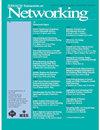Traffic-Aware Merkle Trees for Shortening Blockchain Transaction Proofs
IF 3.6
3区 计算机科学
Q2 COMPUTER SCIENCE, HARDWARE & ARCHITECTURE
引用次数: 0
Abstract
Merkle trees play a crucial role in blockchain networks in organizing network state. They allow proving a particular value of an entry in the state to a node that maintains only the root of the Merkle trees, a hash-based signature computed over the data in a hierarchical manner. Verification of particular state entries is crucial in reaching a consensus on the execution of a block where state information is required in the processing of its transactions. For instance, a payment transaction should be based on the balance of the two involved accounts. The proof length affects the network communication and is typically logarithmic in the state size. In this paper, we take advantage of typical transaction characteristics for better organizing Merkle trees to improve blockchain network performance. We focus on the common transaction processing where Merkle proofs are jointly provided for multiple accounts. We first provide lower bounds for the communication cost that are based on the distribution of accounts involved in the transactions. We then describe algorithms that consider traffic patterns for significantly reducing it. The algorithms are inspired by various coding methods such as Huffman coding, partition and weight balancing. We also generalize our approach towards the encoding of smart contract transactions that involve an arbitrary number of accounts. Likewise, we rely on real blockchain data to show the savings allowed by our approach. The experimental evaluation is based on transactions from the Ethereum network and demonstrates cost reduction for both payment transactions and smart contract transactions.用于缩短区块链交易证明的流量感知Merkle树
在区块链网络中,默克尔树在组织网络状态方面起着至关重要的作用。它们允许向仅维护Merkle树根的节点证明状态中条目的特定值,这是一种以分层方式计算数据的基于哈希的签名。在交易处理过程中需要状态信息的情况下,对特定状态条目的验证对于就区块的执行达成共识至关重要。例如,支付交易应该基于两个相关账户的余额。证明长度影响网络通信,并且在状态大小上通常是对数的。在本文中,我们利用典型的事务特征来更好地组织Merkle树,以提高区块链网络的性能。我们关注的是共同为多个账户提供默克尔证明的公共交易处理。我们首先根据交易中涉及的账户分布为通信成本提供下限。然后,我们描述了考虑流量模式的算法,以显着减少流量。该算法的灵感来自于各种编码方法,如霍夫曼编码、分割和权重平衡。我们还概括了涉及任意数量账户的智能合约交易的编码方法。同样,我们依赖于实际区块链数据来显示我们的方法所允许的节省。实验评估基于以太坊网络的交易,并展示了支付交易和智能合约交易的成本降低。
本文章由计算机程序翻译,如有差异,请以英文原文为准。
求助全文
约1分钟内获得全文
求助全文
来源期刊

IEEE/ACM Transactions on Networking
工程技术-电信学
CiteScore
8.20
自引率
5.40%
发文量
246
审稿时长
4-8 weeks
期刊介绍:
The IEEE/ACM Transactions on Networking’s high-level objective is to publish high-quality, original research results derived from theoretical or experimental exploration of the area of communication/computer networking, covering all sorts of information transport networks over all sorts of physical layer technologies, both wireline (all kinds of guided media: e.g., copper, optical) and wireless (e.g., radio-frequency, acoustic (e.g., underwater), infra-red), or hybrids of these. The journal welcomes applied contributions reporting on novel experiences and experiments with actual systems.
 求助内容:
求助内容: 应助结果提醒方式:
应助结果提醒方式:


